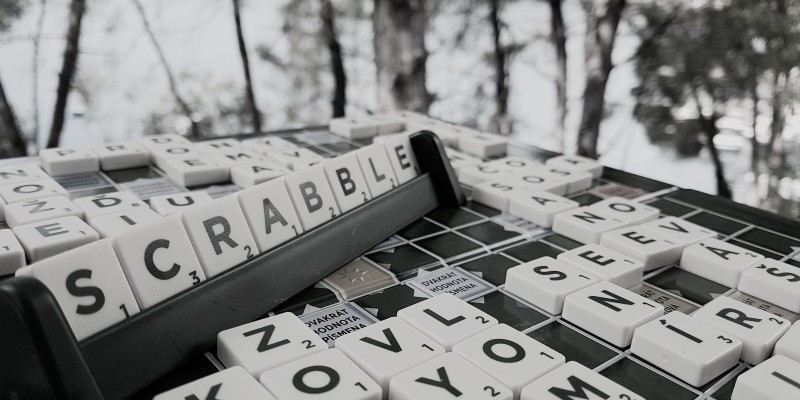I didn’t set out to write a crime novel. My first idea was a novel divided into chapters that end with a couple playing words on a Scrabble board, words that tell their story, how they ended up there and why they are going to die. At a delightful riverside location. My second idea was that the central characters should be Barry Manilow fans, or Fanilows. I quickly dropped this second idea. It wasn’t until the sixth idea that the mafia came into it. The Scrabble mafia. The Scrafia.
Naturally, when I thought of my Scrabble mafia (the Scrafia), I first thought of Joe Pesci types, violent, foul-mouthed, in no way clown-like, heaven forbid. But then if you’re anything like me and believe that no novel about Scrabble world champions should be written without first attempting and failing to become Scrabble world champion oneself, you will have spent three years attempting and failing to become Scrabble world champion. As I did, in my second language.
And it quickly became apparent to me, on the second of many—perhaps too many—Saturday afternoons at the Club Metropolitano de Scrabble in Buenos Aires, in the basement of the Polish Club, on Borges Street, that the vast majority of Scrabble players do not look like the kind of men who, having been told to go home and fetch their shine box, would put your moribund, kicked-in corpse into the trunk of a 1968 Pontiac Grand Prix and drive you out to a secluded rural spot, knife you, shoot you, bury you. They’re much friendlier than that. Indeed, a lot of modern Scrabble players are not, and you’ll be surprised to hear this, burly men with shiny suits and concealed firearms paranoid about that helicopter that’s been hovering around all morning; in fact, many of them are elderly ladies, in woollen sweaters and long skirts or snazzy pant suits and dark glasses on chains. Chattering pleasantly. Showing you photos of their grandchildren. What if, I thought, as we writers often do, these nice old ladies were the Scrabble mafia? I had found my Scrafia.
Because of that serendipitous discovery/my brilliant imagination, I suddenly had a different kind of antagonist, a different set of questions to lead the action: How does an organized crime group led by octogenarian Argentine triplets (they’re triplets, by the way) conduct its affairs? How does it make its illicit money? What is their preferred form of transport? Slowly, the answers came: 1) Cold-bloodedly; 2) Cigarette money, TV money, then when it all starts to go tits up, match-fixing; 3) A cartoon-villain-style airship, with scrabble down the side in great big letters.
The Scrafia—Pelusa, Gachi and Clara Gilbert de Gilbert (they married their cousins)—were born into a wealthy Argentine family that over the course of the 1920s contrived to lose all its wealth, very much in the style of many an Argentine family. Having spent a lifetime struggling to recover the riches of their youth, it was the great Latin American Scrabble boom of the early nineties, a boom engineered to a great extent by the Gilbert sisters themselves, that finally saw them regain what they saw as their rightful place. They remade their fortune off the back of cigarette sponsorship and TV money (little-known fact: top-level Spanish-language Scrabble was the third-most televised sport on the continent in 1995.) And when scandal at the 1996 Atlanta Olympics put paid to some of their illicit antics, they continued to amass their fortune through match-fixing, casually disappearing any rogue players who wouldn’t play along. Even in their advanced years they dressed almost the same—gold-framed sunglasses on a chain which they wore indoors, knitted tank tops in primary colours, pleated skirts, Converse sneakers. You would never have imagined that this was one of the most feared mafias on the continent. But that was what was so devilishly clever about the Scrafia. No one suspected. They were always more Mean Girls then Mean Streets. The perfect cover, until their cover was blown.
(The innocent Buenos Aires Scrabble octogenarians who inspired the Scrafia triplets, who may in fact be septuagenarians, or indeed nonagenarians (Scrabble has a curious way of preserving your youthful looks, if it doesn’t kill you first) are, to date, unaware of their having inspired one of the most iconic mafias (mafii?) of world literature, and may well remain thus until the Spanish translation of the novel comes out next year, by which time I will have left the country.)
But I didn’t set out to write a crime novel. The full extent of crime novels I had read when I set out to not write a crime novel was four. One was Alain Robbe-Grillet’s Le Voyeur, a novel in which it isn’t entirely clear that a crime has even been committed, indeed a novel which I’m not entirely sure I’ve even read, so hazy is my recollection of its salient plot points and characters, if indeed it has any. The other three crime novels were by Graeme Burnet Macrae, whom I enjoy reading primarily because two of his novels, The Disappearance of Adele Bedeau and The Accident on the A34, are accurate imitations of translations of foreign novels, rather like my novel Escapes pretends to be a half-translation of a once-bilingual text. (If anyone has ever gotten away with publishing a bilingual novel, not a novel with the relevant translation on the facing page, but an actual novel in two languages, necessitating a bilingual reader, do get in touch.) So if you’re the kind of person who did a degree in French literature but kind of cheated by reading a lot of the reading list in English, Burnet Macrae’s novels feel very familiar and cleverly done, not to mention the thrill you get that, in reading them, you might somehow be cheating.
After a while it became clear to me that I was, despite myself, writing a crime novel, and so I did what any professional writer would do for inspiration and read John Grisham’s The Firm. It is important for writers who have been forced to read Robbe-Grillet at college and been led to believe that this is what a novel should look like to read some Grisham, otherwise they may never get published, not in this day and age, in this language. I stole many elements from The Firm for my own novel, but also found that some elements therein were already in my novel, which was a nice coincidence and one that means I could never be accused of plagiarism.
But if there’s one crime story that my novel about Scrabble takes its cues from, it’s Goodfellas. The looking back on a glory age long past. The seeing the cracks in the system and knowing it’s going to get pulled down eventually. The perhaps excessive idea of placing a Scrabble player in the Witness Protection Scheme. As far back as I can remember, I’ve always wanted to be a Scrabble champion.
When I raved about one of Burnet Macrae’s novels to my literary friend Kit. He said “Crime, eh?” And I wanted to say “no it’s just a novel” but there you go. All of us snobbish literary fiction people have this thing about “crime” and other genre writing as a distinctly separate section in the bookshop, an area to be pigeonholed, labelled, avoided, perhaps. Like when you say you can’t stand science fiction, until you devour a science fiction book without even realizing you were reading that genre. So it is with Escapes, the kind of novel people will probably describe as “genre-defying.” I didn’t have much idea what kind of genre it was going to be when I started it, I just thought the word “Scrafia” was amusing and that more people should hear about it.
A long, long time ago (thirteen years), when I was just getting started writing, I was in a bad mood one morning when I read something that made me laugh and turn my frown upside down. That someone could write something in one part of the planet that made someone in a completely different part of the planet laugh and slightly improve their morning struck me as a major revelation, a rather simplistic, obvious revelation to brighter readers, no doubt, but a revelation that has informed my writing ever since. When I didn’t set out to write a crime novel, what I was really doing was setting out to make people laugh.
*


















